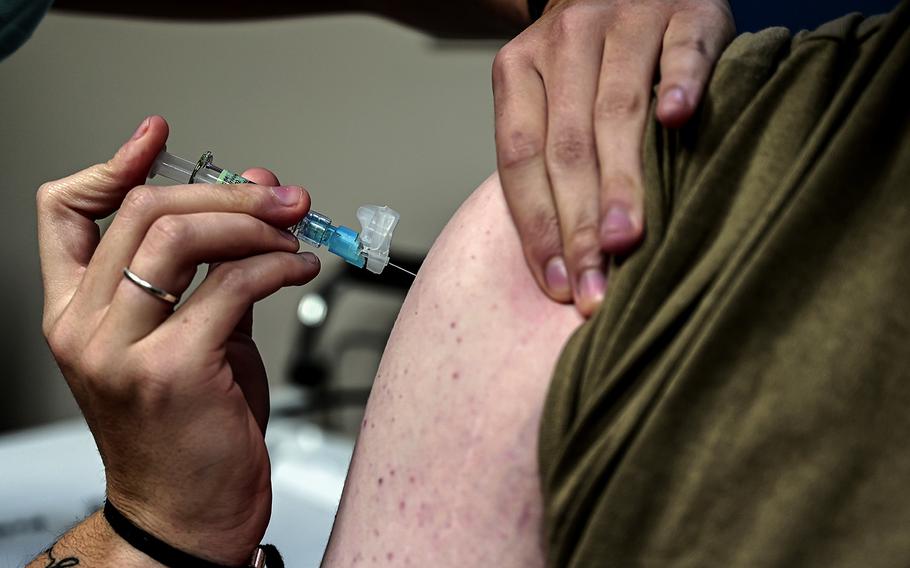
Senior Airman Ava Di Benedetto, 911th Aeromedical Staging Squadron aeromedical technician, administers an influenza vaccination to an airman assigned to 911th Airlift Wing at the Pittsburgh International Airport Air Reserve Station, Pa., Nov. 5, 2020. (Joshua J. Seybert/U.S. Air Force)
Stars and Stripes is making stories on the coronavirus pandemic available free of charge. See other free reports here. Sign up for our daily coronavirus newsletter here. Please support our journalism with a subscription.
WASHINGTON — Military health care workers in North Carolina, Texas and California will be among the first in the Defense Department who can choose to receive the new coronavirus vaccines once they are approved, defense officials said Wednesday.
“The department is strongly encouraging everyone to take it,” Army Lt. Gen. Ronald Place, director of the Defense Health Agency, said during a briefing at the Pentagon.
The Defense Department on Wednesday announced its plan for distributing the allocation of coronavirus vaccines. The department is one of five agencies to be allocated its own supply of the vaccines, along with the Department of Veterans Affairs, the State Department, the Indian Health Service and the Bureau of Prisons.
The department expects to receive its first batch of slightly fewer than 44,000 doses of the vaccines as soon as next week. The doses will be distributed to more than a dozen locations in the United States and overseas as part of a pilot program to make certain the distribution process is working, defense officials said.
In the United States, the locations are Darnall Army Medical Center, Fort Hood, Texas; Willford Hall, Joint Base San Antonio, Texas; Madigan Army Medical Center, Joint Base Lewis McChord, Wash.; Womack Army Medical Center, Fort Bragg, N.C.; Navy Branch Health Clinic, Naval Air Station, Jacksonville, Fla.; Base Alameda Health Services, U.S. Coast Guard Base, Alameda, Calif.; Naval Medical Center, San Diego, Calif.; Naval Hospital, Camp Pendleton, Calif.; Naval Hospital Pensacola, Pensacola, Fla.; Armed Forces Retirement Home, Gulfport, Miss.; Walter Reed National Military Medical Center, Bethesda, Md.; Armed Forces Retirement Home, Washington, D.C.; Portsmouth Naval Medical Center, Portsmouth, Va.; U.S. Coast Guard Base Clinic, Portsmouth, Va.; Indiana National Guard, Franklin, Ind., and New York National Guard Medical Command, Watervliet, N.Y.
Locations outside the continental United States are Allgood Army Community Hospital, Camp Humphreys, South Korea; Landstuhl Regional Medical Center, Germany, and Kadena Medical Facility, Kadena Air Base, Okinawa; and Tripler Army Medical Center, Honolulu, Hawaii.
The locations were picked based on several criteria including having ultra-cold storage for the vaccines, large medical and security staff who can receive the initial phase of the vaccine and also monitor the vaccination process, and prioritization of the location for the services, according to Place.
Once the pilot program proves the distribution process works, the Defense Department will begin sending the vaccine to hundreds of other sites in the United States and around the world, according to Place.
A committee of the U.S. Food and Drug Administration will meet Thursday to discuss whether the agency will approve an emergency use authorization for the Pfizer coronavirus vaccine, one of two vaccines that are likely to receive this approval soon. On Tuesday, the United Kingdom began vaccinating citizens there with the Pfizer vaccine.
Once the vaccine’s emergency authorization is approved, the Defense Department anticipates people will begin to be vaccinated within 48 hours. However, the department will not mandate that personnel be vaccinated because the vaccine is under an emergency authorization.
“This would be the normal process when a vaccine is first issued under emergency use authorization, is typically on a voluntary basis. So we're going to be consistent with that,” said Thomas McCaffrey, the assistant secretary of defense for health affairs.
If the vaccine is eventually fully licensed by the FDA, then the Pentagon will look at whether to make it mandatory for service members, he said.
The department will continue to follow its health protection guidance for the coronavirus pandemic, to include hand washing and social distancing, while it works to vaccinate as many people as possible in the next several months, McCaffrey said.
On Dec. 1, the Centers for Disease Control and Prevention’s Advisory Committee on Immunization Practices recommended health care workers and people living in long-term care facilities should be the first in the United States to receive the coronavirus vaccines.
The Pentagon will follow a similar order for Phase 1 of its distribution plan, vaccinating service members, civilians and contractors who are health care providers and support personnel at military treatment facilities, emergency services personnel and public safety personnel, according to a department.
The next population to get the vaccine in Phase 1 are those who are part of “critical national capabilities,” such as sailors on nuclear submarines, cyber security personnel and defense leaders. A small portion of the initial 44,000 doses will go to the senior defense leadership including acting Defense Secretary Christopher Miller; Army Gen. Mark Milley, the chairman of the Joint Chiefs of Staff; and combatant commanders, according to McCaffrey. Those leaders are also being vaccinated first as part of a messaging campaign to encourage the Defense Department population to get vaccinated, he said.
Personnel who are preparing to deploy within three months will be the next population to receive the vaccine and then all other critical and essential support personnel.
Phase 2 for the Defense Department is vaccinating high-risk beneficiaries, such as residents at the military retirement homes. Phase 3 is vaccinating the remaining healthy population, according to the department.